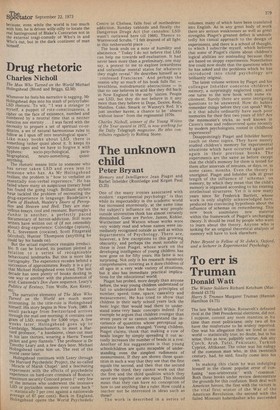Drug rhetoric
Charles Nichol].
The Man Who Turned on the World Michael Holingshead (Blond and Briggs, E2.50)
Whenever he feels his narrative is sagging, Mr Holingshead dips into his stash of polysyllabic LSD rhetoric. To wit, "I was a stranger to myself, a puppet of rote-consciousness, a
cipher on the face of existence, numbed and numbered by a neutral time that is neitner duration nor eternity .. I was faced with the necessity to prepare a set of spiritual co-or
dinates, a set bf natural harmonious rules to follow as I spun off into neurological space." Like many books about LSD, there is something rather quasi about it. It keeps its options open and we have to forgive it with hyphens: socio-psychological, para biographical, neuro-something, quasi anything. The rhetoric means little to someone who has never taken LSD and even less to someone who has. As Mr Holingshead realises, the problem is " how to verbalise an essentially non-verbal experience." He has failed where many an auspicious literary head has found the going tough. Brilliant stylists haN4e tackled the problem of recreating the drug-experience in language: Baudelaire's
Poem of Hashish, Huxley's Doors of Percep tion and Heaven and Hell. They are marvellous essays, cool and resonant. Burroughs's Junkie is another, a perfectly paced
documentary of heroin-addiction. Still more writers have written out of (if not ostensibly about) drug-experience: Coleridge (opium),
R. L. Stevenson (cocaine), Scott Fitzgerald (alcohol), Hunter Thompson (anything he
Could lay his hands on). But the actual experience remains irreducible. rt can be located, its position plotted in relation to a series of recognisable behavioural landmarks. But this is more like cartography. The experience recedes behind a
succession of approximates. Really it is a pity that Michael Holingshead even tried. The last decade has seen plenty of books dealing in one way or another with the phenomenon of acid: Castaneda's Don Juan sequence, Leary's Politics of Ecstasy, Tom Wolfe, Ken Kesey, etc.
The narrative elements of The Man Who Turned on the World are much more
interesting. In the title-role is Holingshead himself. His story begins in New York, 1960. A small package from Switzerland arrives through the mail one morning: it contains one gram of LSD, enough for 5,000 trips. A few weeks later, Holingshead goes up to Cambridge, Massachussetts, to meet a Harvard professor, "a handsome, clean-cut man in his late thirties, wearing a Harris Tweed Jacket and grey flannels." The professor is Dr Timothy Leary and, a few days later, Michael Holingshead turns him on. The rest of the world came later.
Holingshead continues with Leary through the Harvard Psychedelic Project, the so-called Miracle of Marsh Chapel' and a fascinating experiment with the effects of psychedelic experience on hard-core criminals of Boston's maximum security Concord prison (" very few of the inmates who underwent the intensive LSD or psylocibin sessions ever came back" — statistically 7 per cent against a nationwide average of 67 per cent). Back in England, Holingshead opens the World Psychedelic Centre in Chelsea, falls foul of methedrine addiction, Sunday tabloids and finally the Dangerous Drugs Act (for cannabis: LSD wasn't outlawed here till 1966). Thence to Wormwood Scrubs. "I felt drained of all light in this netherworld place ..."
The book ends on a note of humility and abstinence. "Today I do not believe that LSD can help me towards self-realisation. It had never been more than a preliminary, one may say, a pretext to me to explore inwardness and unfamiliar mental states for whatever they might reveal." He describes himself as a confessed Franciscan.' And perhaps the reason why so much of his book falls flat — breathless, melodramatic abstractions — is that no one believes in acid like they did back in New England in the early 'sixties. People use LSD, but they do not believe in it any more than they believe in Dope, Dexies, Reds, Mandies, Coke, Smack or Watney's Red. It's just another haven, a chance to be 'absent without leave' from the regimental 1970s.
Charles Nicholl, winner of the Young Writer of the Year award in 1972, is now working for the Daily Telegraph magazine. He also contributes regularly to Rolling Stone.


































 Previous page
Previous page